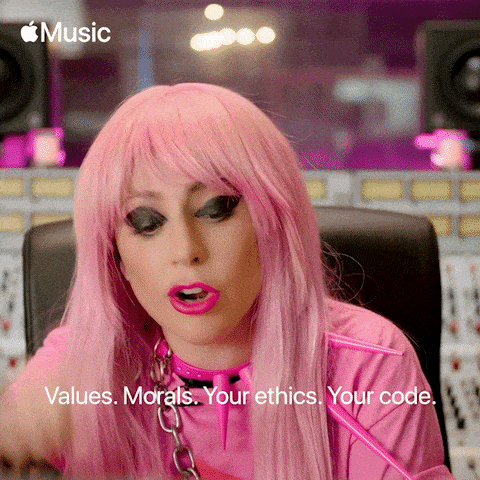I’m taking a course in school called “Crafting your life”, which is supposed to provide us with tools we can use to design and live the lives of our dreams. Business school has been a pretty introspective experience for me and if nothing else, I definitely feel like I have started to ask myself the right questions and hopefully started taking steps toward living my best life. If you’re equally on this journey (or would like to be), then stick around as I share some of the lessons I have learnt so far.
The first part of the journey centers around defining what a life well-lived means to you.
1. What are your core values?
You should have a few core beliefs that guide your actions. For Prof. Clayton Christensen (author of the famous book: “How will you measure your life”), his religious faith was a major source of purpose and direction in his life, so much that he missed playing in a basketball championship game because he made a commitment to God never to play on a Sunday. For others, it could be integrity, empathy or respect for individuals.
Write down your core values. If you’re not sure where to start, start by writing down everything that comes to mind, and then winnowing down until you arrive at 3 – 5 that are most important. It’s important here to identify your actual values, not the ones you think would be nice to have. Next, consider what these values mean to you, and why they are so important. Finally, examine your current life and think about whether you have been living in line with these values.

2. What do you want from various aspects of your life?
Think about the different facets of your life – your career, family, self and community – and picture what would be your ideal outcome in each of those areas. Ask yourself questions like:
- What kind of career do you want? Do you want a demanding but fulfilling or high paying career, or do you want one that gives you time to devote to other aspects of your life? Do you even want a career at all?
- Do you want to be married? Do you want to have kids? Why?
- How do you enrich yourself? Do you want to prioritize hobbies and self-care practices?
- Is giving back to communities you care about important to you? What are these communities? What kind of impact do you want to have there – broad and shallow (shallow impact on a lot of people) or deep and narrow (deep impact on a few people)?
3. What are the pillars of your life?
Looking at those different aspects of your life, you then need to identify what matters most to you. Is it time with family? A global career? Connection to a particular community? The idea is that you can identify one or two (or more) things that are non-negotiable, around which you would then arrange the other elements of your life. Some questions you can ask yourself are: What gives you a sense of meaning and purpose in your life? What are the greatest sources of joy in your life? Are these in line with your values?

4. What tradeoffs are you prepared to make, in the short term and in the long term, to craft the life you want?
There’s a famous saying that “you can have it all, but you can’t have it all at the same time.” This is true for most of us – in order to prioritize certain things, we need to sacrifice others. Once you have defined your pillars, you then need to think about what you are willing to trade off in order to have them. Would you rather work long hours now so you can earn enough to buy a home for your family? Or are you willing to take a lower paying job as long as it allows you enough time to spend with your family? Would you rather satisfy your personal desire to travel to world and learn about different cultures, or plant roots in one place so you can develop closer ties with friends, family or a romantic partner?
5. How do you define success?
What would you consider a successful life? Do you want to see balance across the different pillars of your life, or is there one that trumps all the others? For some people, success means raising healthy and happy children or having long and happy marriages. For others, it is getting to the peak of their careers. For others still, it is making time for all the aspects of their lives, even if they are not the “best” at any.
Laura Nash and Howard Stevenson in their HBR article “Success that lasts” propose a “kaleidoscope strategy”. According to them, success has four components: happiness, achievement, significance (positively affecting those you care about) and legacy (helping others find future success), and lasting success comes from attaining victories in all four areas – just like the different chambers of a kaleidoscope make up one unique picture. To do this, you need to set limits on how long you work on goals in each category before you turn your attention to goals in another category. You would also need to examine your progress regularly to identify areas where you might be falling short, and course correct.
Once you know what your best life looks like, the next step is to use your resources, such as time and money, to create the life you want:
6. How well are you managing your time?
I think most people would agree that time is the most valuable resource each of us has. The problem though is that the way we treat it is not reflective of the value we claim it has. One of the exercises we did in class was to track how we were spending our time for a week and identify how much time we were spending on important vs unimportant activities. We then looked at how these aligned with the pillars we had identified for ourselves. Many of us realized that we were spending time on urgent but less important activities (and even some non-urgent activities) while letting important but less urgent activities (such as exercise, sleep or spending time with loved ones) suffer.
In our generation in particular, time poverty has become a big issue, thanks to a hyper-connected world, unlimited distractions and ever-demanding jobs. We explored a few ideas to manage time better:
- Eliminate technology interruptions. Turn off phone notifications or schedule specific times to check and respond to emails – rather than checking each time you receive an email. If you use an iPhone, you can use the screen time feature to limit time spent on specific apps or on your phone in general. You can download apps to help with this if you are an android user.

- Spend money to free up time. Naval Ravikant (brilliant investor and original thinker I admire) once said that he valued his time by setting an aspirational hourly rate of $5,000, even before he had any money. This meant that he eliminated any activities that were not worth that amount (such as spending time trying to return bad purchases or “arguing with electricians”). His advice is to set an hourly rate for your time and outsource whatever you can for less than your rate.
This may be a somewhat extreme example, but the idea is that once you place a value on your time, you can outsource or eliminate low value activities to make time for high value activities. For instance, consider ordering groceries (and paying the delivery fee) rather than spending hours at the grocery store, and use the time saved to work on your business, read or even rest. You could also pay for a flight rather than a longer bus trip even if it costs more, pay higher rent to shorten your daily commute (side-eyeing my Lagos people that spend 6 hours in traffic everyday), or outsource housekeeping and other mundane chores. Of course, there are real limitations on what each person can reasonably afford, so keep that in mind while thinking about what to eliminate.
- Say “no” more often. If you’re anything like me, you probably have a bit of a problem saying no to people. It could be because you love to help people, you don’t like to disappoint people or you’re just a little too optimistic about how much time you will have in future to do the things you agree to. Unfortunately, you will probably end up with a schedule full of activities for other people, while your own priorities suffer. You need to be deliberate about spending time on the activities that align with your definition of a good life, and that means being selective about what you say yes to.

7. How well are you managing your money?
Personal financial freedom is such an important component of building the lives we want, because it gives us the freedom to make choices without having to worry about whether or how they will impact our ability to provide for ourselves and our families. I can’t cover all the tips we discussed in class in this post (check out my top 5 personal finance tips btw) but here are a few key principles:
- Save/invest at least 20% of your income. One of the most popular rules of thumb in personal finance is the 50-30-20 (or 80-20) strategy for personal finance management. It simply proposes that 50% of your income be spent on needs (e.g. rent, food, insurance etc.), 30% on wants (e.g. social events, gadgets, that nice bag, etc.) while 20% should be saved or invested toward your future. I find that 20% is really a minimum, and you should aim to save more if you can.
I think the most interesting thing I learnt on this topic was goal-based investing. This is essentially a strategy that involves investing in different asset classes (such as stocks, bonds, real estate, etc.) based on specific goals. For instance, if I want to go on vacation next year, buy a house in 5 years, and pay for my children’s university education in 20 years, I can allocate my savings to specific funds corresponding to each of these goals and invest each fund in whichever asset class is most appropriate based on the time horizon and nature of the cash flows I need for each goal.
- Have an emergency fund. If COVID has taught us all anything, it’s that the unexpected can hit us at any time. It’s important to have some funds set aside for emergencies such as job losses, unexpected medical bills, accidents, or destruction of uninsured property, etc. The rule of thumb is that this should be about 6 months of living expenses. Ideally, this should be relatively liquid (in a bank account or money market investment) so that you can easily access it in case of an actual emergency.

- Evaluate your progress periodically. Track your expenses at least monthly and review them against your budget (which you should have). Monitor the performance of your investments. You can evaluate them against the average expected returns for that asset class, or any specific targets you set for the investments. Confirm that you are still on track to meet whatever financial goals they are supposed to account for. Check how your net worth (your assets minus your liabilities) is growing over time.
In doing these exercises, it’s important to recognize that all this is dynamic. Your priorities right now are probably different from what they were 10 years ago and will likely be different from what they will be in 10 years. It’s therefore helpful to reevaluate your trajectory every once in a while.
So, how will you measure your life?
For me, I realized that a life well-lived is a full one – one where I have a fulfilling career, great relationships, time to invest in self-care and hobbies, and the opportunity to make a significant impact on the world.
I want a career that I truly enjoy and believe in. I want to be able to use and develop my strengths and be known for being incredibly competent at what I do. I want to have a family and friends that love and trust one another. I want to surround myself with people that are kind, ambitious and empathetic, as I hope that I am.
I want to be happy and healthy, both physically and mentally, and to spend time on activities that do nothing but bring me joy. Finally, I want to actively participate in making the world a better place than I met it. As a woman, a black person and an African – all demographics that have been and continue to be systematically discriminated against – I intend to use the platforms and opportunities I have been blessed with to create more opportunities for people who look like me.
What about you?
Additional reading/referenced material:
“How will you measure your life?” Article by Clayton Christensen: https://hbr.org/2010/07/how-will-you-measure-your-life
“Success that lasts.” Article by Laura Nash and Howard H. Stevenson: https://hbr.org/2004/02/success-that-lasts
“Which of these 6 time traps is eating up all your time?” Article by Ashley Whillans: https://ideas.ted.com/which-of-these-6-time-traps-is-eating-up-all-your-time/


Thank you Chiamaka for sharing this!
You’re welcome!
Very beautiful.
Thank you!
Nice one Chiamaka.
Well-done.
Thank you!
This is a great piece. A good read to be time conscious
Thank you!
So many gems in this article. Loved it!
Thank you!
This right here is the real deal. You’ve taken your precious time to put it out there, you may not know how you have blessed me right now. Trust me, this write up has hit somewhere in my soul. Thanks.
I’m so glad it resonates!
Damn!! This is gold 🏆🏆
God bless you for taking time to put this together 🙏..
This has helped me to rethink my life 😊
Thank you! I’m glad you found it helpful.